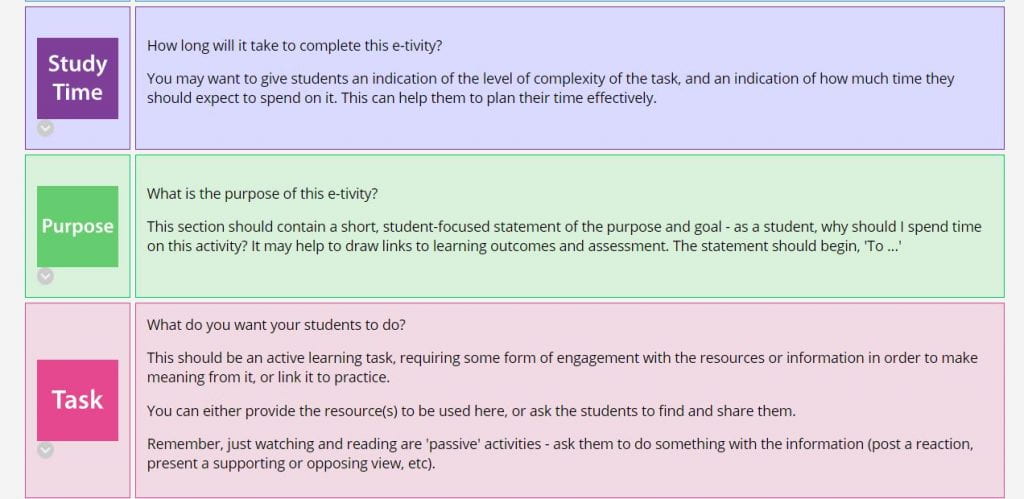Learning and Teaching Innovation Fund 2020/21: Final Report
Title of Project:
Creating a digital workbook to enhance student academic skills: a self-paced journey
Project Leader: Karin Johnstone
Research Team: Kate Swinton, Sam Thomas
- Briefly describe your project, with particular reference to the impact on learning and teaching practice – yours, your colleagues and for the wider university. This could be immediate or potential impact.
Initial Project aims and objectives
- To create a self-paced digital workbook to allow students to reflect on their own learning journey for academic skills.
- To develop a core set of principals which can be used to create other digital workbooks.
- To gather qualitative feedback to determine if the students benefitted from using this workbook.
- To gather quantitative feedback, using institutional tools, on the usage and engagement of the workbook.
The Project so far…
The project created a prototype for a self-paced digital workbook to allow students to improve their academic skills and to reflect on their own learning journey. The first four Learning Modules related to preparing for study at University. The following four modules included aspects of academic skills such as Note-taking, Academic Writing, Constructing Arguments and What is critical thinking? The ongoing version of the digital workbook will increase the amount of Learning Modules.
The workbook also has a Learning Module to signpost students to the academic support systems in place at the university, ensuring that they feel part of a supportive learning culture. Some students find this information difficult to access so it was decided to put this information in one a module in the workbook. The workbook is hosted on the Blackboard Ultra learning platform, where students can simply be bulk enrolled onto this academic study skills course. The workbook can also be ‘pushed’ to the students if their tutor requests this.
Aspects in workbook to develop
The research team is clear about having one workbook that challenges all academic levels from Foundation to Level 7. The team will meet with Learning Designer Nicola Denning to explore ways of achieving this.
Impact analysis
The main strategic policy of the University of Northampton is to be the ‘world’s most socially innovative university’ (Wareing, 2020). This project demonstrates the combination of active blended learning and an integrated learner support model by providing a digital learning environment for students to undertake their own personal learning journey.
Who will the project impact?
As some courses have increasingly large cohorts, such as nursing, this resource can be one way to reach and benefit these students. The key stakeholders for the workbook are not only the students but also the academics. The role of the research team, as learning developers is to provide a clear link between these two stakeholders. Academics will be encouraged to integrate and embed parts of the workbook into their own learning modules.
It was not possible to analyse the impact on the students since the focus group did not engage with the workbook. The reasons for non-engagement may be the level of other work commitments. However, researcher Kate Swinton did have the opportunity to practice her student pitch for the project. The limited engagement, from students, has meant that the qualitative and quantitative feedback for usage and levels of engagement will not happen until the new academic year 2021_22.
Where will the project impact?
The project will impact on teaching, workshops and conferences.
To impact on teaching one potential impact goal will be for the research team to focus again on the Social Work cohort. The first-year social work tutor, Mark Allenby will embed the workbook as a requirement for his first-year cohort. This will mean that data can be collected about student usage and engagement. Researcher Kate Swinton may be able to get the tutor responsible for the Masters programme to do the same, and get the workbook set as a pre-learn task.
At the Learning and Teaching Conference Nursing Lecturer Patricia Jeremiah also expressed an interest in her cohort using the workbook so she will be one of the invited staff members to engage with and promote the workbook to in September 2021.
Table 1
The table below shows the impact goals and the activities that will be used to promote the workbook and engage stakeholders.
| Impact Goal | Activity to reach goal and engage stakeholders | Date |
| Get year 1 Social Work cohort to engage with the workbook | Kate Swinton to liaise with Mark Allenby, social work tutor | Sep 2021 |
| Get feedback from Learning Development Team | Have a morning session promoting it to the rest of the LD team so that they can take ownership of the project too – and become advocates for the workbook |
July/Aug 2021 |
| Get academics on board to embed this into their course | Hold late summer workshops with invited academics to promote the workbook (ALL) | Sep2021 |
| Introduce to first year media students at the start of Semester 2 | Karin to liaise with media tutors such as Anthony Stepniak, Abbie Webber | Jan
2022 |
| Reach all levels of learning with this workbook. | Karin and Sam to liaise with learning designer Nicola Denning | June/July2021 |
| Get Nursing involved in the project | Team to develop working relationship with Patricia Jeremiah | September 2021 |
- Describe how you have, or intend to, disseminate your findings. What would help you with this activity?
This research was presented at two conferences for the academic year 2020_21. It was presented at the ALDinHE 2021 conference which primarily supports people working the area of learning development. It was also presented at the University of Northampton Learning and Teaching conference 2021. The research will be disseminated at other conferences in the next academic year. Two further conferences which may be appropriate are AdvanceHE or BERA.
The work will be written up as a paper or case study, when larger student cohorts engage with the workbook so that authentic qualitative and quantitative feedback can be gathered. For analysis of the data I will get support from Paul Rice in our team. When it is written up as a paper I will look for support from Dr. Emma Kimberley in our team. It may be valuable to have an additional session with research supervisor Prof Pauline Kneale to advise on writing it up as a case study or paper.
- Please reflect on the research process. What was most enjoyable and interesting about it? What barriers if any did you encounter? What would have made the project easier to complete? How did the mentoring relationship help and what would make it more useful in future?
The most enjoyable part of the project was feeling like our research team was part of a wider research community at the University. It was valuable to hear how other academics approached their projects and to hear about the barriers that they encountered. There was a strong sense of academics trying to solve real problems in innovative ways. One example of this was the project by Kirsty Wagstaff. This project provided solutions to problems that Foundation Levels have been dealing with.
The University of Northampton is not a traditional research university, but this project encourages practice based research suitable for the courses that are offered. This was demonstrated by the types of projects that were undertaken; primarily practice based research with a pedagogical underpinning. This project, with its new focus and supportive nature, should have future impact on developing the research culture at the University. Completing the innovation bid also allowed the research team to consider where their ideas for research would align with strategic aims of the University.
Although the research journey was positive there were still barriers that the team had to face. The most difficult part was creating the prototype of the workbook. This was not helped by the technical IT issues that were encountered. Creating the digital workbook involved planning and writing the module content. This was because researchers wanted to limit the duplication of existing learning material. This slowed down the project with the research team too focussed on detail. The team brought in Sam Thomas as a ‘critical friend’ who helped us to see the bigger picture and got the work flow moving again. Sam has worked with the OU and is experienced with designing modules.
Another barrier, which impacted on the analysis of the project, was the low uptake of students that engaged with the workbook. Our contact with students was only online which made it harder to encourage students to engage. Our research supervisor appreciated that research projects are flexible and may not complete all initial aims and objectives. The supervisor suggested that this project is a long-term one. In the next academic year, the team will engage with large student cohorts and collect the data, needed for analysis (See Table 1). Next year tutors will set the workbook as an essential task for their cohort embedding it into course modules. We are in discussions with two tutors, both with large cohort groups; nursing and social work. If the workbook is embedded into their modules the students should see the value of engaging with it.
The research team benefited from the mentoring by Prof Pauline Kneale. Pauline is empathetic and insightful. Pauline simplified our vision and at the same time expanded our timeline for the project. Regular supervisor meetings helped the team be less critical of meeting project aims. Meetings were followed up with notes which was useful – especially for the blog.
- What other reflections on the project do you have that will make the scheme better for participants and the university community?
I participated in the project in 2019_20. For this project the researchers were working independently. Presenting to other research teams made the team feel part of a supported research community. Also, having a research supervisor has been invaluable. It helps having deadlines to work towards too for any presentations and for the supervisor meetings.
I have been promoting the project to other FAST-academic tutors. These tutors are practice based rather than research based, and this project is a good way to introduce ’young’ researchers to the process. It is also ideal for research with practical based outcomes.
References
Wareing, S. (2020) Becoming the world’s most socially innovative university: building better learning, teaching and assessment in a post-COVID19 world. In: Institute of Learning & Teaching Conference 2020. Northampton: University of Northampton.






